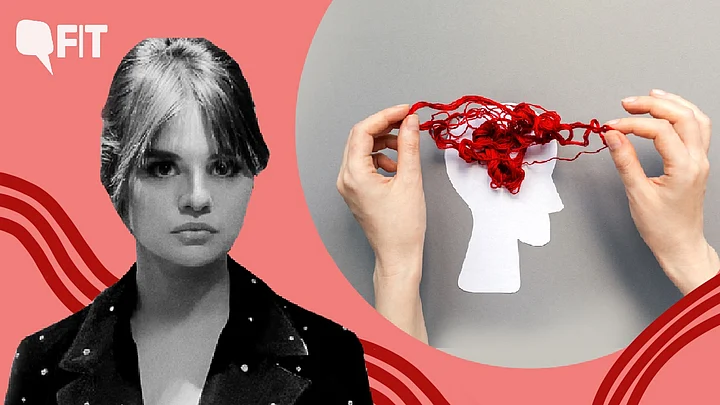(Trigger warning: Mentions of mental health issues, depression, and anxiety.)
Selena Gomez’s documentary My Mind & Me is an honest, personal, and inspiring glance into the actor-singer’s struggles with mental health. The documentary, which picks cues from her journal entries over the years, begins with footage that might shatter the mirage of the 'perfect celebrity life.'
It takes us through Gomez’s journey of being diagnosed with bipolar disorder, her efforts of distinguishing the person she knows she is and the person she becomes when the episodes kick in, and her battle with depression and anxiety, as she keeps putting up a glammed avatar for the world to see each day.
It begins with her struggling to even express or put words to what she is going through, takes us through her psychosis, and ultimately becomes her 'path to self-discovery'.
It shows her at her most vulnerable, and at some of her worst moments as well. Reeling under the self-imposed pressure to perform and feel the best, she wonders when she’ll be “just good enough by myself,” with “voices” in her head telling her that she su*ks.
Gomez is constantly saying sorry to the people around her, and thank you as well. Something she has seen herself do for years, especially after her diagnosis and her episodes of anxiety and depression.
On The Other Side of Glamour
With the paparazzi bombarding her with questions about her relationship with Canadian singer Justin Bieber every time she stepped out and blaming her 'partying' and 'alcoholic tendencies' for her mental health issues, it’s evident that peace is a faraway concept when you’re famous.
The people around don’t help either as they try to console her with generic statements like, 'It’s in your head,' 'You’re your own worst enemy,' and telling her that she is 'letting all this spiral' her.
A six-year-long insight into Gomez’s life feels invasive at times – you’re too close up in her personal space. At other times, it feels packaged to show an inspiring version of her battle with depression, especially since she goes from 'as great as life was, underneath all of it I was struggling' to 'I found that having a relationship with bipolar and myself, it’s going to be there. I am enough, I am Selena.”
But nowhere does it feel fake. She is seen crying, fidgeting constantly, unable to get out of her bed, and sitting alone at the hospital as she gets treated for lupus.
There are times when she’s angry at certain things she is required to do, like her press junket in London that ends up making her feel like a 'product,' after answering hollow questions from uninterested journalists.
'Tracing The Fault Lines to the Past'
The documentary also shows a certain juxtaposition that many people with mental health issues face. She yearns for connection, clings to the memories of her childhood, and goes back to the neighbourhood where she grew up, and the school she studied at.
But, at the same time, there are aspects of her past that she is struggling to let go of. Gomez says in the film, 'It hurts when I think about my past. I want to know how to breathe again.' In another shot, she says,
"I felt haunted by a past relationship that no one wanted to let go of."
Gomez started working at seven and that became her “escape from life.” But this same escape started making her feel vain and lonely, until the feelings surfaced in the form of a nervous breakdown that ended up with her having to go to rehab.
Gomez is severely critical of herself throughout the documentary, brimming with insecurities and self-doubt, questioning if her directors would regret signing a Disney kid who looks like a '12-year-old boy.' Maybe being a child actor isn’t the best thing after all, she muses.
Hope for the Better
The physical struggles of an autoimmune disease flaring up lead her downhill, even with her mental health. She’s as Stoic as one can be when she gets her blood pressure checked, and when she talks about medications, lupus, or even the kidney transplant.
But there are signs of hope as well.
There’s a piece of advice unseemingly intertwined in the film. Gomez talks about how, as a child, she overcame her fear of thunderstorms and lightning by learning more about them. As an adult learning to live with bipolar disorder, she did the same – reading more about the disorder and about mental health. Being honest about it helped too, she says.
Gomez’s documentary might be a personal account of her life alone, but, hopefully, a celebrity speaking up about mental illness would make them less taboo, allowing those who genuinely need help to feel lesser shame or guilt about seeking it.
(Directed and produced by Alek Keshishian, My Mind & Me is now streaming on Apple TV Plus.)

